In a significant stride towards enhancing crop resilience, researchers have pinpointed a key gene in Tartary buckwheat that bolsters the plant’s resistance to salt stress. This discovery, published in the Journal of Integrative Agriculture, could pave the way for developing more robust crops, particularly in regions where soil salinity poses a substantial challenge to agriculture.
Tartary buckwheat (Fagopyrum tataricum), known for its nutritional and medicinal properties, has long been valued for its tolerance to drought and nutrient deficiency. However, its sensitivity to salt stress has limited its potential. Salt stress can lead to water loss, stomatal closure, impaired photosynthesis, and ultimately, reduced yield and quality. Understanding and mitigating this sensitivity is crucial for leveraging the full potential of this sustainable crop.
The study, led by Xiang Lu from the College of Agriculture at Guizhou University and the Institute of Crop Sciences at the Chinese Academy of Agricultural Sciences, employed genome-wide association analysis (GWAS) to identify a locus on chromosome 2 containing 35 candidate genes associated with salt tolerance. Among these, the serine/threonine-protein kinase Aurora-3 (FtAUR3) gene stood out due to its upregulation in response to salt stress.
“Our findings indicate that FtAUR3 plays a pivotal role in enhancing salt tolerance in Tartary buckwheat,” Lu explained. “This gene not only promotes the accumulation of flavonoids, which are beneficial for plant health, but also induces the expression of key genes involved in flavonoid biosynthesis and salt resistance.”
The research demonstrated that a single nucleotide deletion in the FtAUR3 promoter leads to elevated expression of the gene and enhanced salt tolerance. Overexpression of FtAUR3 in buckwheat hairy roots and Arabidopsis thaliana (a model plant) significantly improved salt tolerance compared to wild-type plants. Moreover, FtAUR3 was found to interact with FtGAPB, a critical enzyme in the reactive oxygen species (ROS) pathway, suggesting a potential mechanism through which FtAUR3 contributes to ROS signaling and overall plant resilience.
The commercial implications of this research are substantial. As soil salinity affects approximately 20% of irrigated lands globally, developing crops with enhanced salt tolerance can significantly boost agricultural productivity. “This discovery opens up new avenues for breeding programs aimed at improving salt tolerance in crops,” Lu noted. “By incorporating the FtAUR3 gene into other crops, we can potentially enhance their resilience to salt stress, thereby increasing yields and ensuring food security in saline environments.”
The study’s findings not only highlight the importance of FtAUR3 in salt stress tolerance but also provide a foundation for future research into the genetic mechanisms underlying plant resilience. As the agricultural sector continues to grapple with the challenges posed by climate change and soil degradation, such discoveries are invaluable. They offer hope for developing more sustainable and resilient crops, ensuring food security for future generations.
The research, led by Xiang Lu and published in the Journal of Integrative Agriculture, represents a significant step forward in the quest to enhance crop resilience and agricultural sustainability.

